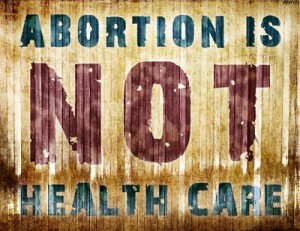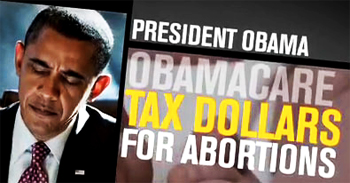WASHINGTON (Reuters) – U.S. Supreme Court arguments over federal healthcare policy were nearly finished on Tuesday when Justice Anthony Kennedy challenged Obama administration lawyer Donald Verrilli on abortion rights.
“Under your view, a profit corporation … could be forced in principle to pay for abortions,” said Kennedy, often the deciding vote on the nine-member court.
While defending the part of the 2010 healthcare law known as Obamacare that requires companies to cover birth control as part of employee health insurance, Verrilli said it was unlikely the government would demand corporations pay for abortions.
 “I thought that’s what we had before us,” John Roberts, the conservative chief justice at the center of the mahogany bench, told Verrilli, who stood at the lectern below.
“I thought that’s what we had before us,” John Roberts, the conservative chief justice at the center of the mahogany bench, told Verrilli, who stood at the lectern below.
By the end, it was clear that clouding the legal test of whether for-profit corporations have religious rights was the country’s enduring fight over abortion, a factor that could influence the outcome on the conservative court.
The case argued on Tuesday was brought by two family-owned companies who objected on religious grounds to the Obamacare mandate that employer-sponsored insurance cover certain emergency birth control methods, such as the “morning-after pill.
Roberts said the companies fighting the birth-control requirement believe some of those methods amount to abortions. The companies contend that some of the methods do more than prevent conception but destroy fertilized eggs.
“It is their sincere belief and we don’t question that,” Verrilli answered. But he said that federal and state laws barring public funding for abortions did not consider the disputed forms of contraception to be abortion.
Tuesday’s 90-minute session, lengthened from the usual 60 minutes to account for the many issues at stake, was tense and hard fought.
PROXY FIGHT FOR ABORTION
The conservative justices most likely to form a majority are the same five who in 2007 upheld a federal ban on a procedure called “partial birth abortion,” marking the first time the court had approved a prohibition on a specific procedure.
Tuesday’s case in the filled-to-capacity courtroom offered a rematch of two high-profile adversaries, lawyers who have squared off repeatedly, including in 2012 when the Obama-sponsored healthcare law faced a broad challenge – and survived.
Paul Clement, a former U.S. solicitor general under Republican President George W. Bush, defended Oklahoma-based arts-and-crafts retailer Hobby Lobby, controlled by evangelical Christians, and Pennsylvania-based cabinet-manufacturer Conestoga Wood Specialties, owned by Mennonites.
Verrilli again represented the Democratic Obama administration. He stressed that the court had never before allowed for-profit corporations to claim a religious exemption to federal law and emphasized the public health interests at stake in the comprehensive healthcare law enacted in 2010.
SNOW OUTSIDE, HOT INSIDE
While hundreds of demonstrators gathered in the light snowfall outside the marble columned building, many carrying signs in support of women’s equality and chanting support for birth control, the tone inside the red velvet and white marble courtroom was heated. The justices have what is known as a “hot” bench because of their active questioning and even interruptions of one another.
When Clement was at the lectern, arguing that the for-profit corporations should be covered by the 1993 law known as the Religious Freedom Restoration Act, liberal justices Sonia Sotomayor and Elena Kagan were among the most scrutinizing.
Sotomayor suggested that if Clement prevailed, corporations with religious owners might try to object to insurance coverage for blood transfusions or vaccines. Added Kagan: “You would see religious objectors come out of the woodwork with respect to all of these laws.”
When Clement returned to the lectern for his last few minutes of rebuttal, he bypassed such liberal assertions and seized on the conservatives’ abortion colloquy with Verrilli.
Clement said that abortion-related conscience clauses in federal law exempt even for-profit medical providers from being forced to perform abortions.
“But we learned today that … if Congress changes its judgment and says that a for-profit medical provider has to provide an abortion, (the Religious Freedom Restoration Act) doesn’t apply. That, with all due respect, cannot be what Congress had in mind when it passed” the law, he said.
None of the justices interrupted him on that point. A ruling in the case of Sebelius v. Hobby Lobby Stores and Conestoga Wood Specialties Corp. v. Sebelius is expected by the end of June.






